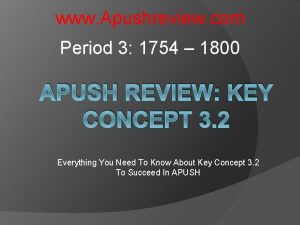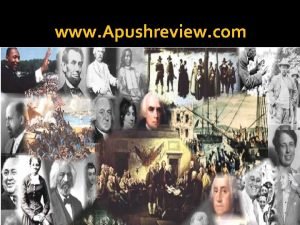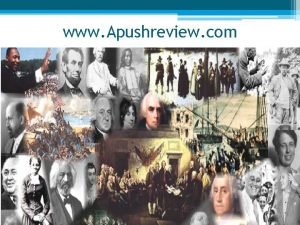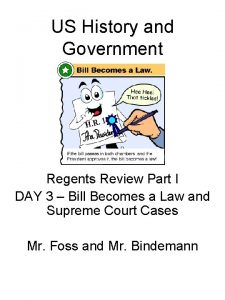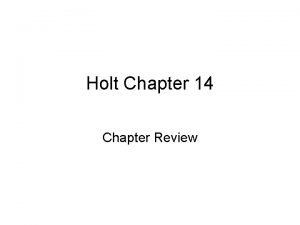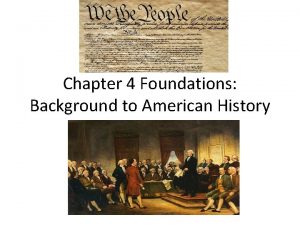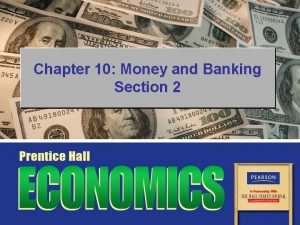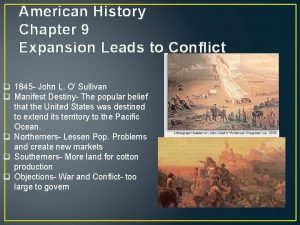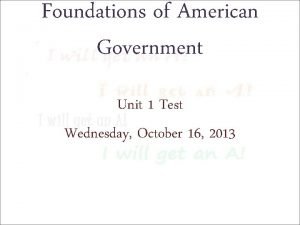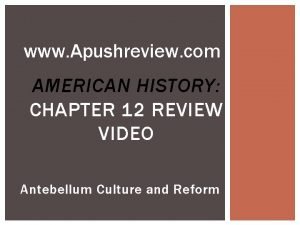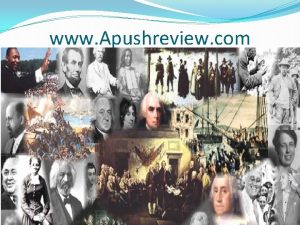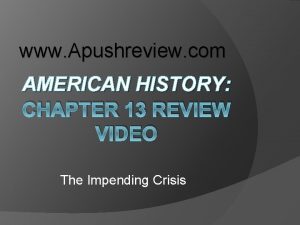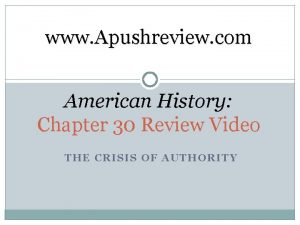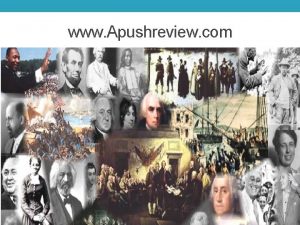www Apushreview com American History Chapter 15 Review














- Slides: 14

www. Apushreview. com American History: Chapter 15 Review Video Reconstruction And The New South

The Problem of Peacemaking • Reconstruction questions: o How should the South be readmitted? o Should leaders be punished? • Radical Republicans: o Thaddeus Stevens and Charles Sumner o Wanted harsh punishments for the South and its leaders • Wade-Davis Bill: (1864) o Majority of white males must pledge allegiance , abolish slavery in state constitutions, and disenfranchise Confederate leaders o Pocket-vetoed by Lincoln • Presidential Reconstruction plans o Lincoln’s 10% Plan: (1863) • Much more favorable than Radical Republicans • 10% of voters in 1860 election took oath of loyalty • Lincoln hoped to extend suffrage to certain African-Americans o Johnson’s Plan: (1865) • Favored oath of allegiance, could pardon wealthy Confederates • Favored appointing a governor for each state • By end of 1865 all seceded states met requirements of Lincoln’s or Johnson’s plans

The Problem of Peacemaking • 20% of the adult white male population died • “Lost Cause”: o Looking fondly at the South as it was pre-Civil War o Leaders were revered o Many whites wanted to preserve this culture and way of life • Differing views of “freedom” o Southern whites – freedom from the North and federal government o African Americans – same rights and protections as whites • Freedmen’s Bureau: o General Oliver Howard o Provided food, education, and assistance to former slaves and poor whites o Its biggest success was in EDUCATION!

Radical Reconstruction • Why did Congress refuse to recognize Southern governments and begin “Radical Reconstruction? ” o “Black codes”: • Harsh laws for African-Americans, could be arrested for being unemployed o Many Southern states elected high ranking Confederates to Congress • Alexander Stephens – Former VP of CSA became a Senator from GA • Civil Rights Act of 1866: o Like almost all acts, it was vetoed by Johnson, then overridden by Congress o Granted Citizenship to African Americans • 13 th Amendment: o Abolished slavery • 14 th Amendment: o Granted citizenship to those born in US, and guaranteed “privileges and immunities” o Would reduce representation in Congress if a state denied suffrage to adult males o Former Confederates could NOT hold office

Radical Reconstruction • Congressional Reconstruction: o TN first state to be readmitted to Congress o The rest of the South was divided into 5 military districts • Congress must approve the state constitutions o 3 states still not readmitted – (VA, TX, and MI) • 15 th Amendment: o Suffrage could not be denied based on “race, color, or previous condition of servitude” • Ex Parte Milligan: o Military courts were unconstitutional where civil courts could be used o Went against Reconstruction in the South o Radicals threatened to disrupt the Supreme Court • Johnson is impeached: o Violated the Tenure of Office Act: • President must get consent of Senate before removing cabinet members o Johnson is impeached, however, he is NOT removed from office

The South In Reconstruction • African-Americans made up a voting majority in SC, MI, LA, AL, and FL o Republicans benefited from this • Key terms to know: o Scalawags: Southerners that favored Reconstruction (mostly for economic reasons) o Carpetbaggers: Northerners that moved South during Reconstruction: • Doctors, lawyers, teachers • African-Americans: o Served as delegates to many state constitutions o 20 became members of the House, and 2 in the Senate • Education: o Huge accomplishment during Reconstruction o By mid 1870 s, 50% of white children, and 40% of black children went to school o South began to create segregated schools

The South In Reconstruction • “ 40 Acres and a Mule” o Never really happened, although some African Americans did gain land under the Freedmen’s Bureau • Sharecropping: o Renting land paying via crops o If a drought or poor farming hit, tenants would be in trouble • Crop-Lien: o Receiving credit from a local store, usually at a HIGH rate (50 -60%) o Usually led to debt for borrowers • African-American Women: o Usually worked in domestic tasks o 50% of black women worked for money; most were married

The Grant Administration • Most of his administration is associated with “scandal and corruption” o Regularly used the Spoils System o Republican Party split for the 1872 election over “Grantism” o In the end, Grant served two terms, 1869 -1877 (tried for a third later) • Credit Mobilier: o Union Pacific RR company created bogus contracts to make $ o Members of Congress, and Grant’s VP accepted bribes • Whiskey Ring: o Government officials were creating false tax reports o Secretary of War accepted bribes • Panic of 1873: o Worse depression of the century to that point o Began by over-investing in RRs o Debtors favored printing paper $ - increase money supply -> inflation -> easier to pay off debt • Specie Resumption Act: o New certificates would be based on gold; eliminate greenbacks • Seward’s Folly - 1867 (Not part of Grant) o William Seward purchased Alaska from Russia o Seen as a mistake by some, later produced large oil reserves

The Abandonment of Reconstruction • By 1877, Democrats “redeemed” 7 states in the South • Red Shirts and White League: o Forced whites to join the Democratic Party, monitored elections • KKK: o Terrorist organization that used to intimidate and prevent blacks from voting • Enforcement Acts: 1870 -1871 o Response to the KKK o Federal government could now prosecute criminals of federal law o President could use the military to protect individual rights • The Panic of 1873 weakened support for Reconstruction

The Abandonment of Reconstruction • Compromise of 1877: o Hayes (Republican) v. Tilden (Democrat) o Tilden received 184 electoral votes to Hays 165; 185 needed to win • 20 votes were in dispute o Eventually, all 20 were given to Hayes • Importance of the Compromise of 1877? o RECONSTRUCTION ENDS! o The military is withdrawn from the South o Many African-Americans felt betrayed • Legacy of Reconstruction: o Mostly a failure o Civil Rights not fully addressed

The New South • By 1878, all Southern states had been “redeemed” by Democrats • Education decreased o “schools are not a necessity” • Industrialization came slowly at first o James Duke – American Tobacco Company o RRs increased drastically in 1880 s • Used the same gauge as the North (standard gauge) o Many factories refused to higher African-Americans • Those that did paid little and provided harsh jobs • Black colleges increased

The New South • Booker T. Washington (former slave): o Tuskegee Institute o Advocated blacks to gain an education (vocational training) • Learning skills (today – plumbing, auto repair, etc. ) o Believed African-Americans should “adopt the standards of the white middle class” o Economic gains before Social gains • The Atlanta Compromise: o African-Americans would NOT challenge segregation if they had economic opportunities • Civil Rights Cases of 1883: o 14 th Amendment did not prevent private discrimination, only government discrimination • Plessy v. Ferguson: o Established “Separate but equal”

Disenfranchising African. Americans • Poll taxes: o Required a tax to vote • Literacy Tests: o Required to pass a test to vote o African-Americans often received a much harder test • Grandfather clause: o Poll taxes and literacy tests were not required to vote if their ancestors could vote in the election of 1860 • Blacks could not vote in 1860 • Jim Crow laws: o Legal segregation in the South o Upheld by Plessy v. Ferguson • Lynching: o Increased drastically in the 1890 s o Ida B. Wells • Journalist that spoke out against lynching

Thanks for watching! �Subscribe to my channel �Help spread the word • Questions? Comments? Ideas for videos? o Leave in comments Subscr i Down be here!
 Bài thơ mẹ đi làm từ sáng sớm
Bài thơ mẹ đi làm từ sáng sớm Cơm
Cơm Apush review period 6
Apush review period 6 Apushreview.com period 3
Apushreview.com period 3 Apushreview.com
Apushreview.com Marbury v madison significance apush
Marbury v madison significance apush Apush
Apush American history regents review
American history regents review Chapter review motion part a vocabulary review answer key
Chapter review motion part a vocabulary review answer key Chapter 4 foundations background to american history
Chapter 4 foundations background to american history Chapter 10 section 2 the history of american banking
Chapter 10 section 2 the history of american banking American history chapter 9
American history chapter 9 World history chapter 6 review
World history chapter 6 review Foundations of american government unit test
Foundations of american government unit test Chapter 6 career readiness chapter review
Chapter 6 career readiness chapter review



